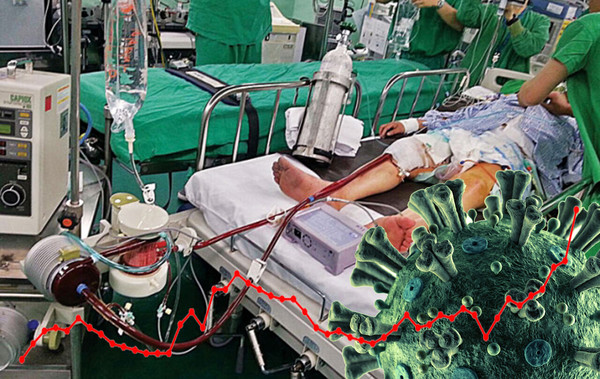The fourth wave of Covid-19 is increasingly weighing on critical care, as the number of severely ill Covid-19 patients receiving extracorporeal membrane oxygenation (ECMO) doubled in a month.
The Korea Disease Control and Prevention Agency (KDCA) said there were 379 critically ill Covid-19 patients as of Tuesday midnight, up by 12 from the previous day. The critically ill receive high-flow oxygen therapy, ventilator, ECMO, and continuous renal replacement therapy (CRRT).
Daily new cases have been surpassing 1,000 for over a month. As of Tuesday midnight, the country added over 2,200 cases, pushing the total caseload to 216,206. One more death occurred on Tuesday, raising the death toll to 2,135.
With more Covid-19 patients becoming seriously ill, the number of patients on ECMO is hitting a new high every day. Physicians use ECMO when medications or ventilators do not improve the patient’s conditions.

According to the Korean Society for Thoracic & Cardiovascular Surgery (KTCS), the number of Covid-19 patients on ECMO surged to a record high of 53 on Tuesday, reaching a new high in a week.
A week ago, the KTCS said there were 37 patients on ECMO, the highest since the KTCS began collecting ECMO data in September 2020.
In early July, the number of critically ill Covid-19 patients on ECMO was hovering at around 25. In just a month, the number more than doubled, and most of them are in their 50s or younger.
In the past week, the Gyeonggi area around Seoul added 10 ECMO patients. However, a spike in the number of severely ill patients made ECMO machines insufficient, and some hospitals in greater Seoul have to borrow them from other regions.
The nation is using about one-third of ECMO machines due to Covid-19.
There are 383 ECMO machines in Korea, and 109 are in operation. Of them, 51.4 percent are used for Covid-19 patients.
treatment requires more healthcare manpower. The rising number of patients on ECMO could reduce services for other patients in critical care and lower the number of available beds for critical care.
ECMO requires specialists in thoracic surgery, pulmonary medicine, intensive care, and extracorporeal circulation specialist. Korea has 220 extracorporeal circulation specialists.
The Ministry of Health and Welfare said 62.1 percent of the total 807 beds for the severely ill were in use, and 306 beds were left. In greater Seoul, where Covid-19 cases are spiking, 140 beds are left for the critically ill. Among 419 beds for less severely ill patients, 147 are left, and 72 of them are available in greater Seoul.
On a recent YouTube show, Jung Hae-hun, a professor of preventive medicine at Gachon University College of Medicine, said the increasing proportion of Covid-19 patients aged under 60 who progress to the severe disease was putting a heavy burden on medical care.
The longer hospital stays could also use up beds for the critically ill, he said.
“In the past, Covid-19 patients hospitalized as severely ill patients were mostly seniors who died. But now, there are not many deaths because a majority of them are in their 40s and 50s,” Jung said.
Covid-19 patients in their 40s and 50s have a high chance of recovery, so physicians tend to choose ECMO treatment, which makes their hospital stay longer.
“If the age of the severely ill patients becomes younger and the number increase, it will put a lot of burden on medical care,” he said.

